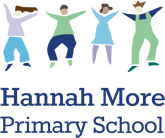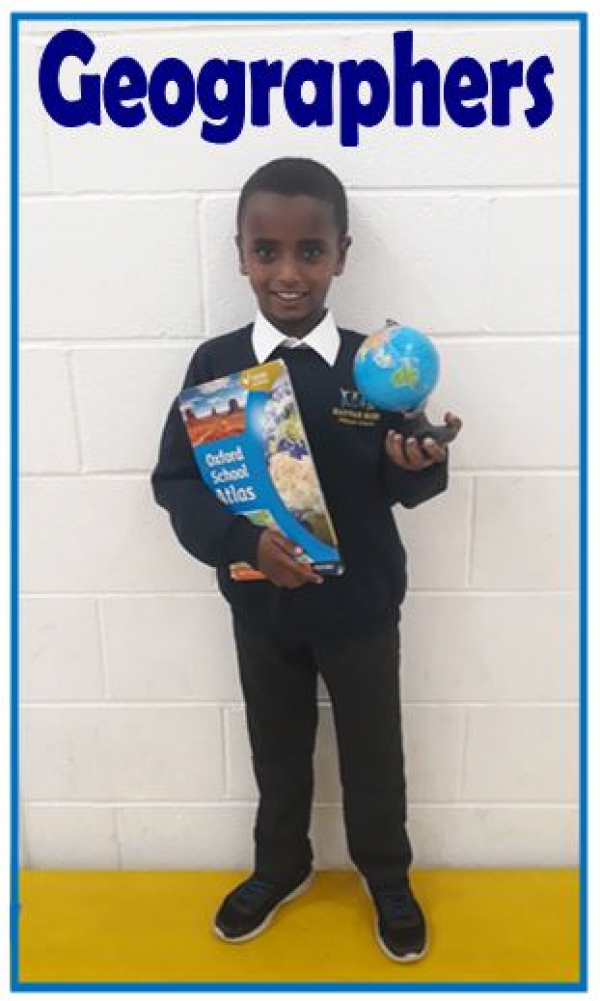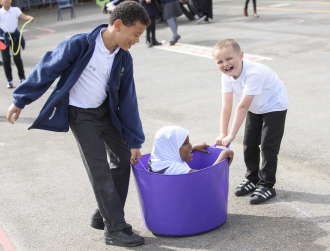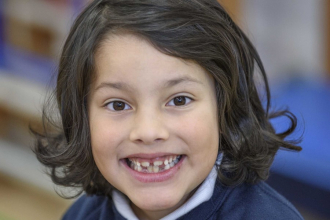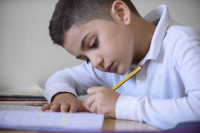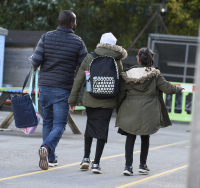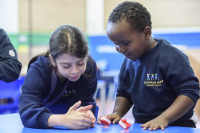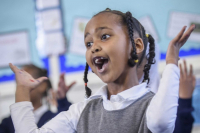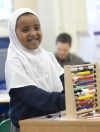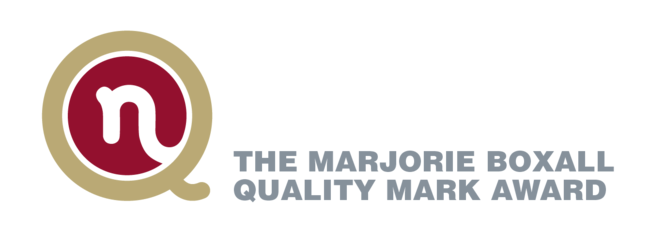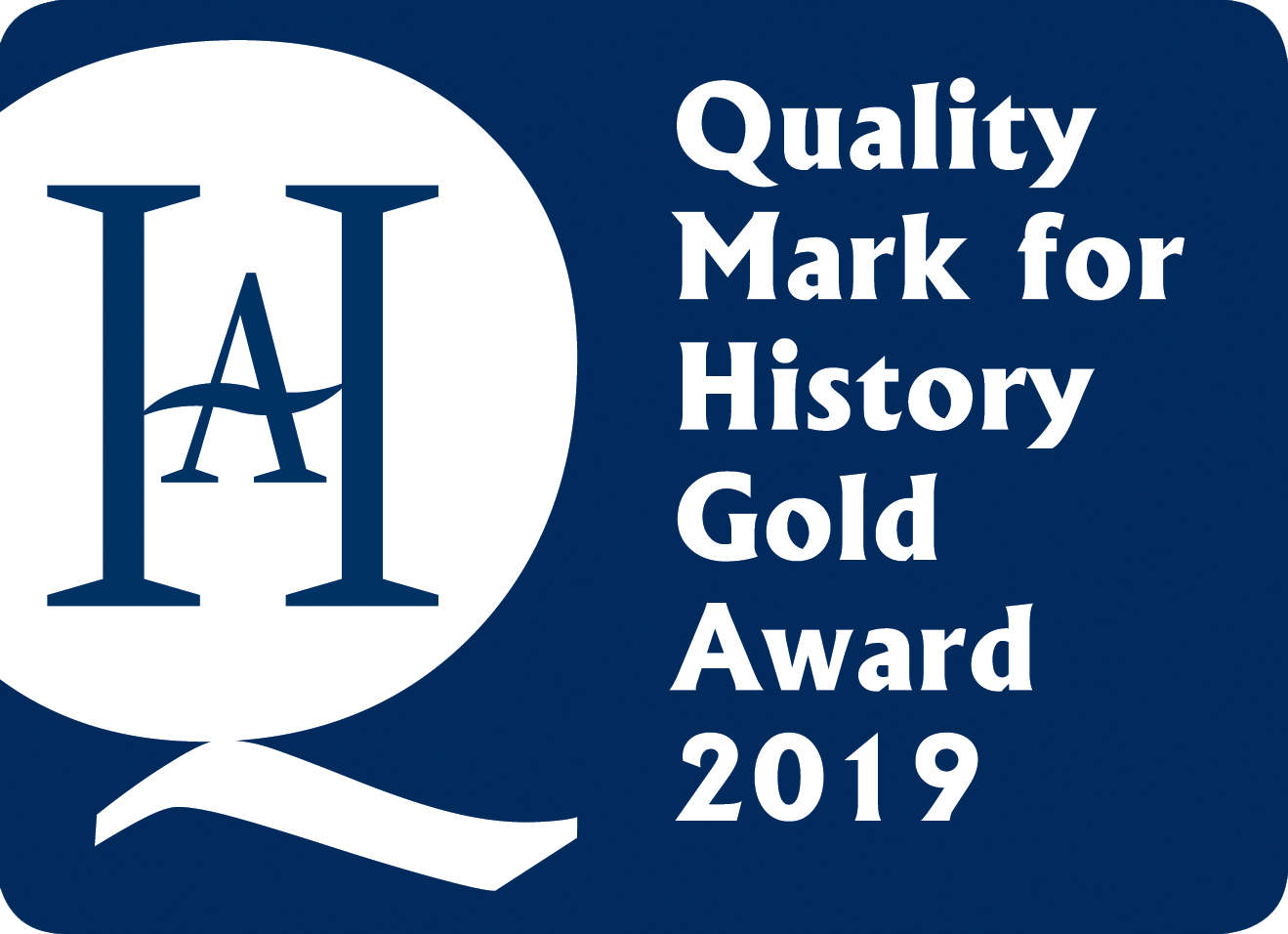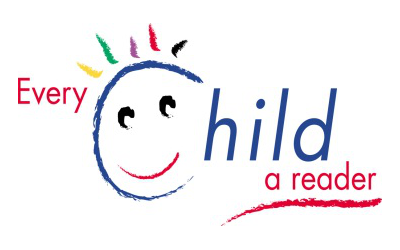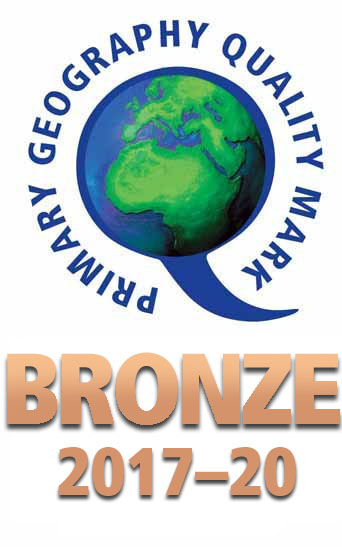
Our learning (29)
Intent
At Hannah More we offer a music curriculum that equips all children with the knowledge and skills they need to start their journey as a confident musician. Our curriculum meets the formal requirements of the National Curriculum and allows children to build their musical skills during their time at primary school. Oracy is embedded throughout the teaching of music and is recognised as a way to improve musicianship by scaffolding discussions and helping children to express their opinions.
At Hannah More, we inspire children to develop as musicians by introducing them to past and current musical heroes from all backgrounds and cultures. We invite local musicians into school to introduce children to different instruments and to give them experiences of live music, which helps to build the children’s cultural capital.
Implementation
At Hannah More we deliver an engaging curriculum through a variety of different sessions. Music is taught through class lessons, key stage singing assemblies, instrument lessons, preparation of songs for class performances, carefully selected music played during assemblies and extra curriculum activities.
To successfully teach music lessons, teachers are provided with music planning documents that have been carefully written by the music leader who is an experienced musician. The lessons form part of a music enquiry which is taught during one term each year. During this term, year groups learn about the inter-related dimensions of music. Children revise what they learnt in previously year groups and build upon this. Throughout the music enquiry, year groups work towards completing a composition which they perform to each other and evaluate at the end. This enquiry culminates in the children producing and performing a play. Part of the preparation for this is learning a collection of songs, which are sung in ensemble and taught with a focus on diction, pitch and dynamics.
Some Key Stage 2 classes have whole class instrument lessons provided by ‘Bristol Plays Music’ (Bristol Beacon). These sessions enhance learning from the enquiry lessons whilst giving children the experience of playing a tuned instrument. Children learn to work as an ensemble which develops both their listening and collaborative skills.
In addition to classroom-based lessons, children also attend singing assemblies. Key Stage 1 and Key Stage 2 attend separate singing assemblies which allow children to develop key singing skills which are specific for their key stages and learn songs which are appropriately challenging. Children have the opportunity to perform the songs they have learnt to all teachers, parents and other key stages during Friday assembly.
Music is played during the beginning and end of assemblies. The Music played in assembly is carefully selected by either musical characteristics or inspirational musicians. The music is accompanied by a live recording of musicians playing the music. During Singing assemblies, the music leader talks about the composer, instruments played and any other key learning. Children are exposed to a wide variety of music of different genres and music from around the world.
Extra-curriculum activities are provided for children to develop and consolidate musical skills. Activities include Key Stage 1 and 2 choirs, recorder club, ukulele club and a music club for the Early Years which introduces children to instruments and how music is created.
During EYFS, pupils explore music through a combination of child initiated and adult directed activities including musical activities related to stories that they are currently reading. Children have the opportunities to explore the different dimensions of music using non-tuned percussive instruments. The musical activities also aims to develop children’s listening skills.
Mid-way through the year, children are taught musical games that they can then play during their independent learning time to continue exploring the different dimensions of music.
Towards the end of the year, children complete series activities which explores timbre, rhythm and beat through body percussion.
Throughout the year children develop their musicianship through learning rhymes and singing songs.
Impact
Music lessons at Hannah More give pupils the key skills needed to learn an instrument and to become musician. Children leave Hannah More Primary school with the ability to listen to music and understand how it has been composed and to compose and perform their own music. Children also leave Hannah More school with the ability to work in a team, to collaborate on a project and to reflect, evaluate and improve. Children also leave school with the understanding that music can be used as a way to promote their own mental health. Some children may find that music is the medium through which they can express themselves and use to support their own mindfulness.
We have been awarded the Music Mark. See Certificate
![]()

Intent
At Hannah More we offer a high-quality geography curriculum that helps pupils gain a coherent understanding of the world we live in. Geography lessons help to provoke thoughts and provide answers to questions about natural and human aspects of the world. At Hannah More, children are encouraged to develop a greater understanding and knowledge of the world, increasingly using their prior knowledge to make links and solve problems.
The Geography curriculum enables children to develop knowledge and skills that are transferrable to other curriculum areas. At Hannah More our intent, when teaching geography, is to inspire the children to have a curiosity and fascination about the world and people within it; to promote the children’s interest and understanding of diverse places, people, resources and natural and human environments, together with a deep understanding of the Earth’s key physical and human processes. Discussion is a key part of lessons and Oracy skills are embedded within lessons to support the children in sharing their opinions.
Within Geography, opportunities exist for children of all ages to experience learning beyond the classroom. This allows them to enrich their knowledge by visiting places they may not normally consider or places of geographical interest within the local area. Not only do these visits contribute towards enriching the curriculum, but they also support our children in developing their own cultural capital.
Implementation
At Hannah More, Geography is taught throughout 2 or 3 enquiries in each year group. The lessons can be stand alone or mixed with other subjects such as Science or History. We cover the National Curriculum, supported by a clear skills and knowledge progression. This ensures that skills and knowledge are built on each year and sequenced appropriately to maximise learning for all children.
In geography lessons teachers to use a variety of teaching methods and recognise different learning styles. This may be using physical maps and atlases, using online mapping tools or looking at photos and pictures to stimulate learning and discussion. The curriculum is planned and taught taking into consideration the needs of all pupils based on their relative starting point. It is important that children develop the skills of a geographer by fully immersing them in all areas of the subject.
The local area is well utilised to achieve desired outcomes, with opportunities for learning outside the classroom embedded in practice. School trips and fieldwork are provided to give first hand experiences, which enhance children’s understanding of the world.
In addition to the enquiries, during arts week each year group conducts an in depth study of a different continent, therefore covering all 6 inhabited continents by the end of Year 6. With knowledge of the physical and human aspects of that continent, children then go on to create a variety of art, design, music and drama outcomes.
During EYFS, pupils explore the world around them through a combination of child initiated and adult directed activities.
They have the opportunities to:
- Explore and observe features of the natural environment
- Explore materials such as sand, water, shells and rocks
- Discuss the weather and seasonal changes
- Play with small world resources such as train tracks and city blocks and manipulate these as they wish
- Explore the local environment – looking at maps and following basic directions
Impact
As a school we evaluate the impact of our wider curriculum through:
- Lesson observations
- Pupil voice
- Book scrutiny
At Hannah More Primary School, our curriculum enables children to gain a broad and balanced understanding of the key geographical skills and knowledge of their local, regional and global environments. The curriculum supports children in developing their understanding of both the physical and human geography around the world. By the end of Year 6 children have a secure and varied knowledge about the world around them and are curious to always find out more.
We assess the children’s work in Geography while observing them working during lessons. Questioning is used to form part of the teacher assessment. Evidence is collected in pupils exercise books and the class floor book which acts as a ‘snapshot’ of the learning that takes place. We also use pupil voice as a tool to develop the future teaching and learning of Geography.
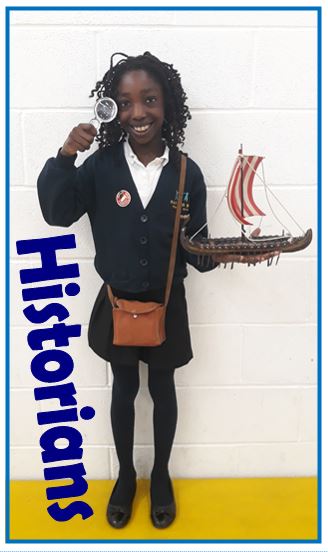 Intent
Intent
At Hannah More, we endeavour to develop a curiosity about the past through learning about a wide variety of local, national and global historical events and people. Through their secure chronological understanding, children will be able to compare periods of time and identify and explain changes over time. It is our intention for children to leave Hannah More with an appreciation of the importance of history and how it has impacted our lives today.
Our progressive curriculum enables children to pose questions and investigate the past using both primary and secondary sources. Children are taught the skills to identify the richness, reliability and relevance of sources and discover information for themselves, as Historians. Skills are mapped out to ensure children can explain aspects of history and develop an understanding of why interpretations may differ. It is our aim for children to be able to apply the skills and understanding taught at Hannah More, to any area of history.
Implementation
Each year group is taught two historical enquires ensuring coverage of the skills and periods of time set out in the National Curriculum. ‘Being a historian’ is an integral part of our history curriculum. The progression of skills and knowledge along with key vocabulary, has been carefully designed to build and develop key concepts such as chronological understanding, causation, similarities and differences. Children have access to a variety of high quality primary and secondary sources of evidence (artefacts, pictures, diaries, books etc) and develop their skills to question and interpret these for themselves, ensuring that key language is being explicitly taught along the way. This develops children’s critical thinking and allows them to apply skills and unpick knowledge for themselves, thus developing their interest and curiosity. Our historical enquiries are designed to be as relevant as possible to our children and therefore local links are made to strengthen the children’s connections to the current day and develop their curiosity about the place they live.
Black History Week is an important part of our history curriculum. Each year group studies a significant individual or event that has shaped the lives of black people both locally and worldwide. Children at Hannah More are from diverse backgrounds, with families speaking more than 60 different languages, and therefore our curriculum is carefully planned to be as representative of our children as possible. For example, in Year 4 children study the Early Islamic Civilisation of Baghdad, in Year 6 children research and discover more about their own family heritage and throughout all the enquiries significant individuals have been carefully chosen to represent the varying demographics of our school population.
Each enquiry ends with a showcase giving the learning a real purpose and enabling children to display the skills and knowledge they have gained. Enrichment opportunities are also undertaken with children partaking in an educational school trip or learning from a visitor to the school.
During EYFS, pupils develop their historical understanding through a combination of child initiated and adult directed activities.
They have the opportunities to:
- Think about changes that have happened during their own lives
- Explore some historical artefacts such as old toys, old phones, old photographs
- Read stories which illustrate changes that take place during a person’s lifetime
- Look at old photographs of the local area and discuss how it has changed
Impact
A clear skills progression allows teachers to use formative assessments to ensure children are making progress in history and to aid them in identifying any gaps or misconceptions in both history knowledge and skill. Verbal and written feedback is provided and children are given time to respond to this. Teachers adapt lessons to ensure misconceptions are addressed and learning loops are in place to allow children the chance to revisit and compare historical events and times previously taught.
At Hannah More, children talk with confidence and enthusiasm about history. Pupil voice is used to assess the knowledge and skills pupils have gained during their history enquiries and to ensure learning is stored in their long-term memory. Work scrutinies are also used by the subject leader to ensure teacher judgements are correct and that progress is evident across the school.
“Playing is integral to children’s enjoyment of their lives, their health and their development. Children and young people – disabled and non-disabled – whatever their age, culture, ethnicity or social and economic background, need and want to play, indoors and out, in whatever way they can. Through playing, children are creating their own culture, developing their abilities, exploring their creativity and learning about themselves, other people and the world around them. Children need and want to stretch and challenge themselves when they play. Play provision and play space that is stimulating and exciting allows children to encounter and learn about risk. This helps them to build confidence, learn skills and develop resilience at their own pace.” Play England “Charter for Children’s Play” 2015
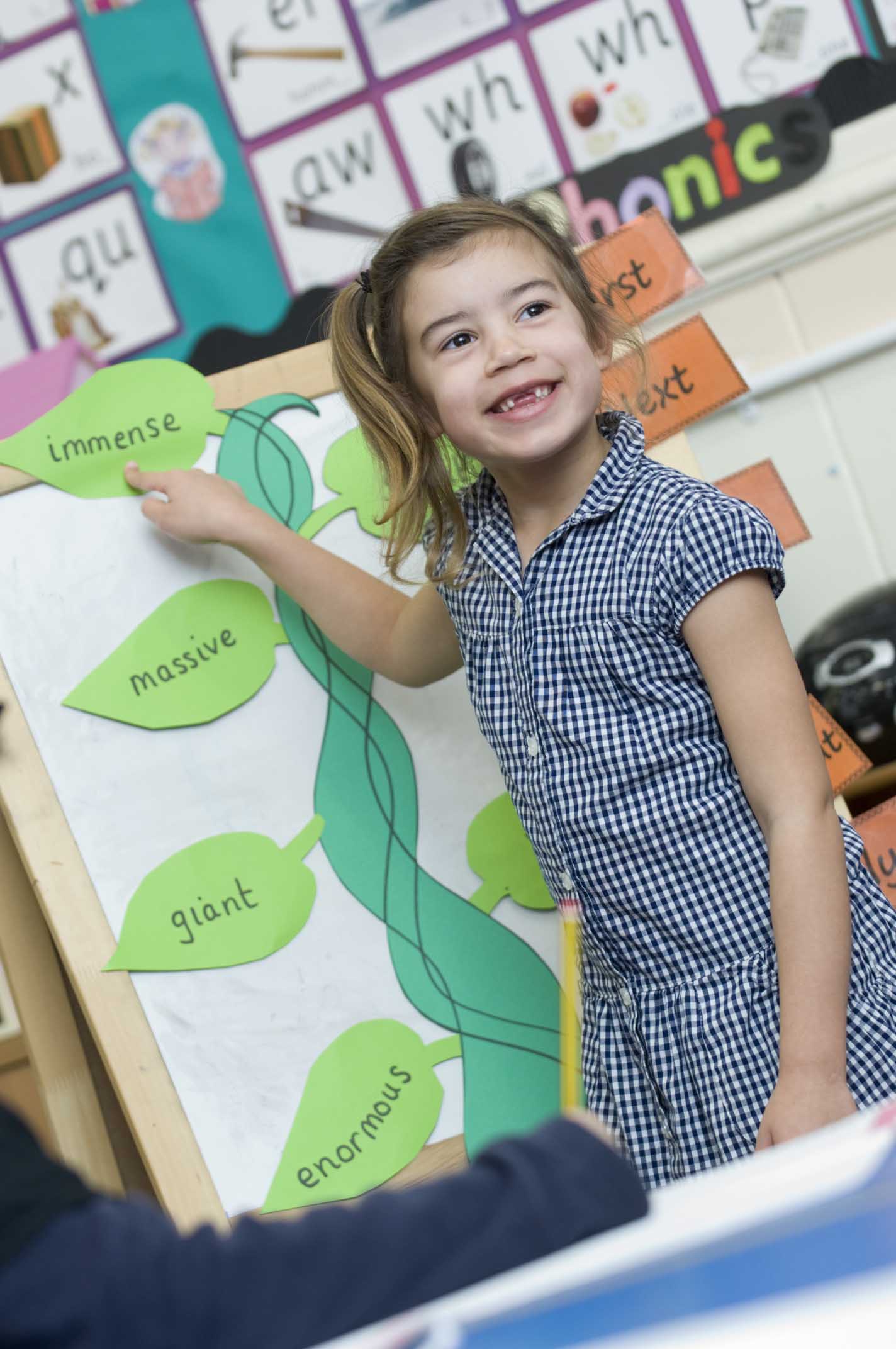 For Phonics results click here
For Phonics results click here
For latest Key Stage 1 results click here
For latest Key Stage 2 results click here
Each week, a child from each class will be chosen as a 'SuperKid'. These will be children who have shown excellent behaviour or outstanding learning consistently, throughout the week. These children will join Mr Hawkins for Superkid tea on Friday afternoon.
During the last week of each term, a child will be picked to be 'Learning Champion'. This is awarded to children who have worked hard all term.
At Hannah More, we believe that homework supports children’s learning and is an important extension of the work we do in school. It helps parents to understand our curriculum better and gives them opportunities to support this.
Across the school, we set homework each week on a Thursday to be returned on the following Monday. We also expect parents to read at home with their child every day, in addition to homework tasks.
We provide a homework book for children to complete their work in.
We have produced an information leaflet for parents about homework, which can be found here. Lots of ideas for helping your child with spellings can be found here.
If you are looking for extra support for children in Years 3-6, there are after-school classes available at the IntoUniversity learning centre, based at the Old Library, Trinity Road. To find out more about what they offer, click here.

Hannah More Primary is an inclusive school where all staff are committed to the success of every pupil.
All children are valued, respected and welcomed at our school, whatever their additional educational needs may be. We support children’s learning and aim to ensure they are fully included in all school activities.
As a school we follow the Government’s Code of Practice to identify, assess and support pupils with special educational needs.
Through the use of Pupil Profiles, we provide support that is tailored to meet each individual pupil’s needs. Support may be in the classroom, in a small group or through separate activities. Support is delivered by a skilled team of teachers and teaching assistants.
For further information please see our School's SEND Report, Ordinarily Available Provision document and Special Educational Needs Policy.
Hannah More’s Local offer forms part of Bristol City Council’s Local Offer. For more information on how the needs of our SEN are met in Bristol please see the Local Offer Website: https://www.bristol.gov.uk/web/bristol-local-offer
Useful links and Websites:
Bristol’s Local Offer: https://www.bristol.gov.uk/web/bristol-local-offer
Supportive parents- impartial advice and support in meeting the needs of SEN children: http://www.supportiveparents.org.uk/services-in-bristol/
Khaas- offering social activities, respite care and short break holidays for BME children with Special Educational Needs: http://www.khaas.co.uk/
Our curriculum nurtures self-belief through:
- building positive relationships between all members of the community
- explicit teaching of the skills needed for effective learning
- promoting self-awareness and emotional intelligence
- building resilience through strong PSHE and wellbeing
Our curriculum inspires success through:
- having high expectations for all children,
- stimulating curiosity and excitement and developing independence.
- enriching children’s life experiences
- teaching children to be confident communicators with strong language skills
- involving families in children’s learning
